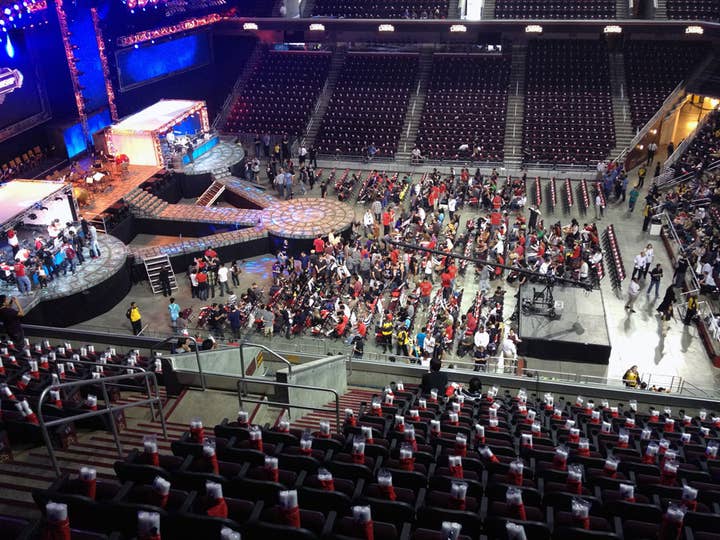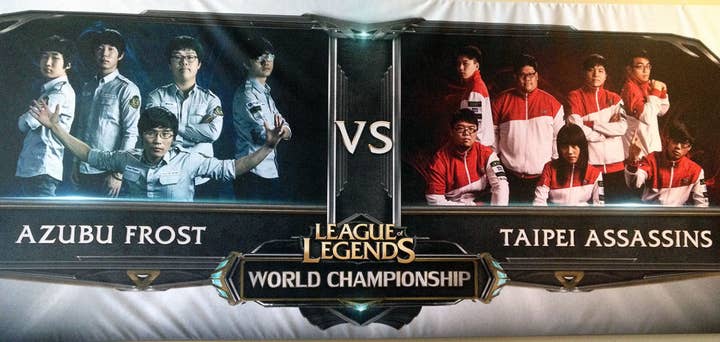Taipei Assassins win $1m League of Legends World Championship
Riot Games and e-sports also came out ahead at LA event
The League of Legends World Championship finals concluded Saturday night with an epic battle, as the underdog Taipei Assassins crushed the Korean team Azubu Frost 3-1, winning the $1 million dollar prize.
Ten thousand fans packed the Galen Center arena on the University of Southern California campus, and millions more watched the live-streamed event around the world (based on preliminary numbers). This was quite possibly the largest e-sports event ever held, both in terms of the audience and the prize money.
"The streaming video of the semi-finals was watched by so many people it took up 5 percent of the total Internet bandwidth of North America"
The event resembled a professional sporting event, with elaborate staging that included a live orchestra on stage for the opening ceremony, elevator platforms lifting the competitors onto the stage from below, and color commentators for the matches. The fans provided intense energy during the competition, with the Taipei Assassins being the clear crowd favorite, though Azubu Frost had been favored to win.
The events of the semi-finals, with Azubu Frost being fined $30,000 for cheating (though they were not eliminated, since the cheating was ruled not to have affected the outcome of the match) against the USA's Team SoloMid, made the mostly American crowd in the arena supporters of Taipei Assassins.
The Taipei Assassins took an early lead in game one against Azubu Frost, but the Koreans fought back to win in a series of intense skirmishes that involved most of the players on each team; Azubu Frost won nearly all of those team fights. Chastened by their first game loss in the best-of-five series, the Taipei Assassins settled down to play a patient strategy, waiting for small opportunities to gain an advantage and avoiding mistakes. Even when Azubu Frost seemingly presented a tempting target, the Taipei Assassins would back away when they felt too vulnerable.
Each game after the first, the Taipei Assassins would gradually open up a lead that built throughout the game until they could land the final blow. Azubu Frost was unable to adapt their strategy to counter the methodical, relentless pressure of the Taipei Assassins, and the Assassins became the World Champions.

There were other winners at this event, though: Riot Games and the entire field of e-sports both came out ahead. The process has not been an easy one; controversy dogged the League of Legends semi-finals last week, with accusations of cheating, technical problems that forced the postponement of some matches, and concerns over how this would affect the finals. Decisive actions seemed to have taken care of these issues.
Riot admitted that there were problems (something that seems to be beyond the ability of some companies), as CEO Brandon Beck said, "If you saw the playoffs you saw some of our hiccups." Riot worked diligently to solve the problems, although it meant holding the concluding matches of the semi-finals at Riot headquarters instead of at the previous venue. "If you're not making mistakes, you're not moving fast enough," Beck said. The important part for him? "Don't make the same mistake twice."
Staging these games required a massive effort; nearly everyone at Riot contributed to some degree, and many employees have done little else for weeks even though that's not normally their day job. They've had to build a broadcast crew from scratch, an enormous technical and logistical challenge. As Beck admitted, Riot is losing a lot of money on this event.
Why, then, does Riot choose to do this? Beck says it's because "Some games are like movies, and some are like amusement parks - League of Legends is like a sport." The game is competitive, and provides spectacle and dramatic moments like the most popular sports. Beck believes that treating the game like a professional sport by providing tournaments increases the enjoyment of all fans of the game. Riot doesn't feel that there's a turnkey solution out there for e-sports, and that doing it themselves is the best way to get the results they want, even though it's been a difficult and expensive process.
Seen another way, though, putting on this tournament is a major marketing and PR investment. Millions of players were watching, and many were dreaming that they might be capable of winning one million dollars. Crazy? Perhaps, but it's a more likely dream than becoming a major league sports star. It provides validation, too; when someone sneers at your game playing, you can say that the best players in the world just won one million dollars playing this game. People tend to take that much more seriously.
In an age when traditional marketing channels like magazine or television ads don't really reach your core audience, event marketing can be an effective way to generate excitement and engagement. E-sports are gaining in importance, as audiences reach and exceed the level of traditional sports. The average League of Legends pro event now attracts more viewers than the average Major League Baseball game, according to Riot.
"The average League of Legends pro event now attracts more viewers than the average Major League Baseball game, according to Riot"
Riot spared no effort in presenting this event and making sure it got good coverage. Over 100 reporters from around the world were brought in to cover the proceedings, and the event was reported by all the major news networks. Riot succeeded in generating media attention far beyond the standard games media, with coverage from major television networks, newspapers and magazines.
Measuring the effectiveness of such event marketing on the fan base is difficult, though. If player numbers climb next month, how much of that was due to the events of the last month? Despite the uncertainty, Riot is convinced that this effort is worthwhile. The players love it, and Riot feels that as long as they keep the players loving the game they will continue to do well.
League of Legends Season 3 will no doubt be even bigger. As Riot's recently released numbers show, the game now has 12 million daily players, far more than any other game. According to Riot, the numbers continue to grow every month. The streaming video of the semi-finals was watched by so many people it took up 5 percent of the total internet bandwidth of North America, according to Riot. That's an amazing number, but to Riot it just means there's 95 percent more bandwidth left to conquer.

